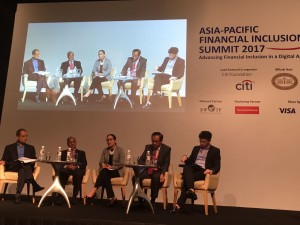Using Digital Space for Financial Inclusion

Bangko Sentral ng Pilipinas director for finance advocacy and head of financial consumer protection Pia Roman (center) speaks at the Asia Pacific Financial Inclusion Summit
The Philippines seeks to harness opportunities in the digital payments space in order to make the financial system more inclusive.
At the recent Asia Pacific Financial Inclusion Summit in Hanoi, Vietnam, Bangko Sentral ng Pilipinas director for finance advocacy and head of financial consumer protection Pia Roman said policy-makers and regulators needed to understand what’s happening in the market in the face of many innovations today.
“We need to keep an open mind, understanding the risks and moving cautiously and prudently on how these innovations can be enabled in our respective jurisdictions,” said Roman, who was part of a plenary session that tackled regulation and supervision for inclusive innovation. More than 450 thought leaders in the inclusive finance ecosystem gathered in Hanoi during the two-day summit on March 21-22, which was organized by the Citi Foundation and the Foundation for Development Cooperation (FDC) in partnership with the Banking with the Poor Network and The Economist Group. This year, the State Bank of Vietnam was the official host of the summit, which was themed “Advancing Financial Inclusion in a Digital Age.”
Roman said that to achieve greater financial inclusion, one area of focus in the Philippines was the implementation of the national strategy for financial inclusion where 15 government agencies were involved along with the private sector. “This is important as we see many innovations in the market. There are different providers, different services – so it’s really not just the central bank – and this kind of coordination is important as we move forward,” Roman said. Looking at opportunities in the digital space was likewise cited as an area of focus. “ We know that the traditional constructs – the bricks and the mortars – will never be enough in reaching our large and unbanked markets. Technology and digital financial services are key in this respect,” Roman said.
“We are looking at the national retail payment system as an enabler because it will allow people to send, receive and store value in an account and make payments or transactions from one account to another,” she said.
Despite great progress made over the past decades in financial inclusion worldwide, some two billion adults do not have access to the banking system and more than half of these “unbanked” people are in Asia Pacific. As people need to make payments, Roman this would be the first step where they can be included in the financial system. “This is an important first step, having a transactional account, and eventually their payment behavior or experience through time could allow them to have deeper and more valuable services from these providers. This is another area where we are seeing a potential big win in financial inclusion,” she said.
Michelle Curry, chief executive officer of FDC called the impact of the digital age on financial inclusion “arguably the greatest financial reform of our time” and added that it was “both encouraging and inspiring to see such dedication to the reform evidenced by the large number of attendees at this sellout Summit”.
Madam Nguyen Thi Hong, Deputy Governor of the State Bank of Vietnam, spoke about the future of financial inclusion in her keynote address.
“More organizations are offering new financial products and services that change the form and nature of the market and are shaping the future of financial inclusion. This rapid change presents challenges in terms of management, monitoring and risk of information and system security. Therefore, it is critical to harmonize the goals of financial innovation, integration and consumer protection to maximize the benefits of financial inclusion,” said Hong.
“The inclusive finance ecosystem is evolving to include not only financial service providers, both banks and non-banks, but new players, like mobile money providers and e-money operators, to name a few,” said Brandee McHale, president of the Citi Foundation and director of Corporate Citizenship at Citi. “What we will explore at this year’s Summit, is the need to balance new innovative technological advances and creative partnerships with policy that will continue to not only help drive financial inclusion for low-income populations but also protect vulnerable populations,” she added.
Over the two-day summit, delegates debated issues, shared case-studies, analyzed trends and explored opportunities to drive collective action.
